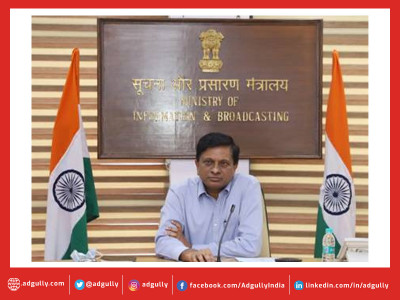Combating film piracy is a priority: Apurva Chandra, I&B Secretary
The Information & Broadcasting Ministry has assured the film fraternity that suitable amendments would be proposed to the Cinematograph Act 1952 to combat film piracy. Addressing a Consultation Meeting of Film Associations through video conferencing last week, I&B Secretary Apurva Chandra said that the issues with respect to proposed Cinematograph Amendment Bill and anti-piracy issues will be addressed after consultation with the stakeholders of the industry.
An Expert Committee under the Chairmanship of Justice Mukul Mudgal was constituted in 2013 to examine the issues of certification under the Cinematograph Act, 1952. Another Committee of Experts was set up under the Chairmanship of well-known filmmaker Shyam Benegal in 2016 to evolve broad guidelines for certification within the ambit of the Cinematograph Act and Rules. Among the recommendations is the age based certification of films.
Secretary Chandra also spoke about the merger of four film media units – namely, Films Division, Directorate of Film Festivals, National Film Archives of India, and Children’s Film Society, India with the National Film Development Corporation (NFDC) Ltd. He expressed that the basic objective is that NFDC should become the entity through which the revenues from the film sector can be utilized for development of the film sector. He went on to say that none of the existing schemes is being discontinued. “We will strengthen NFDC so that they can rotate staff and deliver on the responsibilities assigned to them,” he added.
Speaking about the Finance Minister’s announcement of setting up an Animation, Visual Effects, Gaming, and Comic (AVGC) Promotion Task Force, he informed that the Ministry is working on its Terms of Reference. “We hope to set up this Task Force in this month itself, so that work can begin and we are able to utilize the potential of the sunrise sector.”
Chandra expressed happiness that the industry is satisfied with the streamlining of the film certification processes by CBFC. Additional Secretary I&B, Neerja Shekhar, informed that comments of stakeholders and the general public have been received regarding suggestions on further improving the certification process of CBFC.
Prasoon Joshi, Chairperson, CBFC, said that the change in design of the film certificate is symbolic of what the Board seeks to achieve, in terms of making processes seamless, digital and more stakeholder-friendly. “The process of certification has been smoothened as much as possible; while we continue to need human intervention for watching the films and certifying it, we have streamlined the system so as to speed up other parts of the process,” he added.
Ravindra Bhakar, CEO, CBFC, briefed about the journey of the certification body and its adaptations in view of new challenges. He also spoke about the digitisation in certification process and move towards further transparency and measures towards ease of doing business.
Move to increase screen density
Neerja Shekhar, who chaired the meeting, discussed the initiatives taken by the Ministry for Information and Broadcasting (MIB) and various central sector schemes being implemented with respect to the film industry, including incentives for shooting foreign films in India and organising a global media & entertainment summit.
She also pointed out the requirement for increasing the density of screens. “The Government is planning to come up with single window clearances for opening of film theatres and also for event management,” she said and also informed that ideas are being sought for setting up rural theatres and mobile screens in order to achieve this objective. “We are going to work in a big way in increasing theatre density, in collaboration with states and UTs,” she mentioned.
Shekhar also spoke about the incentives under the audio visual services of Champion Services Sector Scheme. “Audio Visual Services is one of the 12 champion service sectors which the government seeks to promote,” she said. The Government has approved financial incentives for co-production of films in countries with which India has co-production agreements. “For audio visual co-production with foreign countries, reimbursement of up to Rs 2 crore or 30% for a Rs 25-crore budget film is available. Similar incentive is available for shooting foreign films in India.”
Regarding participation of Indian films and filmmakers in foreign film festivals, the Additional Secretary said that there is a need to increase screening of Indian films at international film festivals and showcase India’s soft power. “We need specific content from industry which helps showcase Indian films to foreign countries where the demand for Indian films is present.” She stressed on the need to focus on specific markets which demand Indian content.
Around 50 representatives of film associations attended today’s meeting and participated in the consultation process.




Share
Facebook
YouTube
Tweet
Twitter
LinkedIn